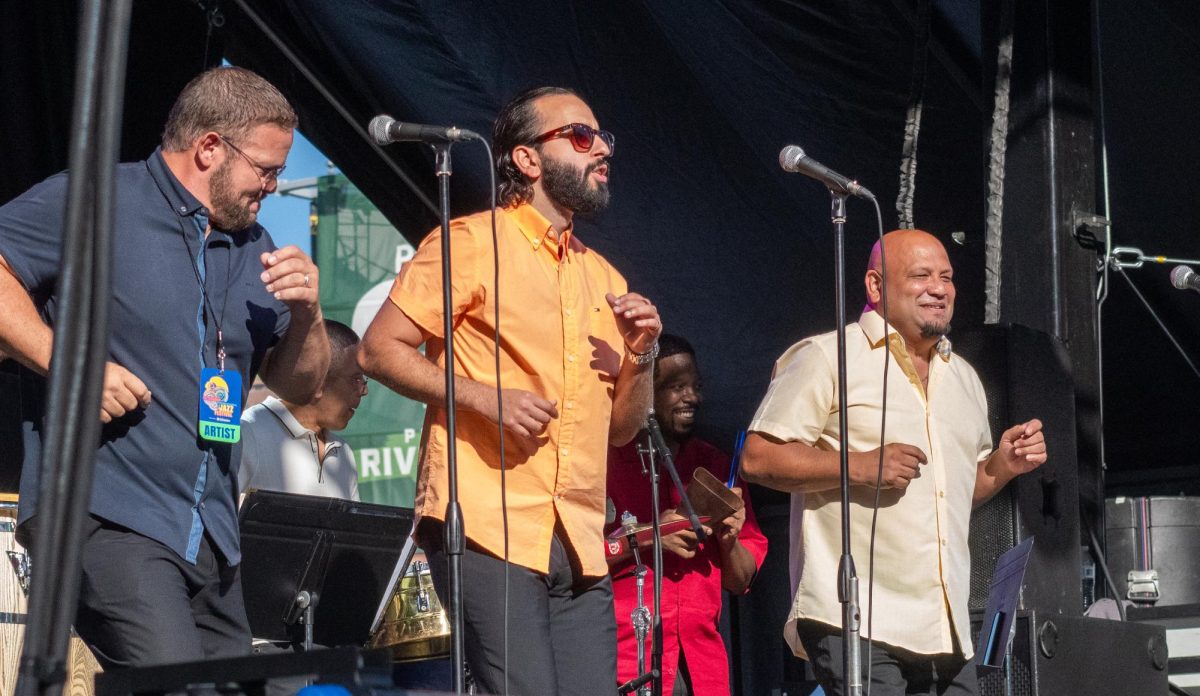As people passed Highmark Stadium on a stroll by the Monongahela River, a soothing and enchanting melody hung in the air –– the unmistakable sound of jazz.
The Pittsburgh International Jazz Festival brought together 14 jazz artists and groups on Saturday and Sunday, Sept. 16 and 17. The 10-hour show supported a large array of artists, from Grammy Award recipients to Pittsburgh local jazz performers.
Christie Dashiell, a singer-songwriter, educator and the second artist to take the stage on Saturday said it is her duty to continue spreading the art form of jazz. Dashiell said jazz is valuable and must continue to be promoted and supported
“As I got older and decided to go to college for music, I got the sense that people felt like jazz was passé and old and really intellectual,” said Dashiell. “It’s my duty to make sure that people know about this music and this art form, it’s ours to spread and to make new, and to keep alive.”
Dashiell said many jazz artists, including herself, dedicate a lot of effort to placing their identity into their music. Dashiell says jazz may be perceived as stagnant or dull because the listener does not fully delve into the music.
“It’s about taking the music that we grew up on like gospel, R&B, soul, funk, and hip-hop and integrating it and incorporating it into our music,” Dashiell said. “I think that people think jazz is old and they think it’s stale, but if you really dig into the music, it has a history of always taking culture and putting it inside of this improvised setting.”
Chelsea Baratz, saxophonist, vocalist, composer and the first artist to play on Sunday, is a Pittsburgh local artist with deep roots in the city’s vibrant music scene. Baratz said her journey as a jazz musician began at a young age, and she hasn’t stopped since then.
“I had teachers in both middle and high school who were the band directors and they were actively involved as professional musicians,” said Baratz. “My high school teacher was the one who told me to go to my first jam session ever at the Crawford Grill in the Hill District, which is a very historic venue in the history of jazz in Pittsburgh.”
Baratz said she found inspiration as a child in the unlikeliest of places — “The Simpsons.”
“As I think about the dynamics of influences and who we would see playing saxophones, I don’t really recall seeing many women saxophone players growing up,” Baratz said. “I was looking for role models to look up to musically, but there was something about Lisa Simpson, she was a soulful saxophone player who was doing justice to jazz and Black American music while being a young girl. I’m as serious as a heart attack when I say that Lisa Simpson is why I started playing the saxophone.”
Andrey Chmut, a saxophonist and a member of the Bob James Quartet, said he had a very distinctive path that led him to jazz.
“My dad was a pastor in a small church in western Ukraine and I saw a saxophone player there when I was nine years old and it blew my mind,” Chmut said. “When the war started in Ukraine, I moved to the United States and he [Bob James] called me and asked me to play on tour with him, I was very shocked and excited.”
Chmut said he had grown accustomed to playing to a European audience and found challenges playing in the United States, the birthplace of jazz. Chmut said they have helped him develop his career as a jazz musician.
“It’s very different playing music here compared to Ukraine, his music was born here in the US and it has a high level of listeners,” Chmut said. “For me, it’s a big challenge but I really like it because I can grow with my music.”
Michael Palazzolo, an upright bass player and a member of the quartet, brings his music to life on a four-foot-tall instrument. Palazzolo said there are many challenges to playing such a large instrument, and sometimes all he needs is luck.
“I prefer smaller venues because of the instrument I play –– acoustic bass is better introduced into smaller rooms,” Palazzolo said. “One thing an upright bass player [faces] on tour is it’s challenging because you can’t bring your own bass unless you’re willing to risk the safety of it, so we rent the basses sometimes it’s a great bass, sometimes not so much.”
Palazzolo said he finds value in playing as a group with Bob James on the keyboard, Andrey Chmut on the saxophone, James Adkins on the drums and himself on the bass. He emphasized the essence of the music he performs is rooted in teamwork.
“I take the approach of I’m paying attention to the band, Bob is the leader so I’m trying to keep my eyes on him and James and Chmut, that’s the most important thing,” Palazzolo said. “If we’re a unit together, the audience will respond well to us.”
Baratz also considers how the audience is responding to her music. She said her music is meant to positively affect the listeners’ mood and uplift their spirits. Baratz said playing jazz is what fixes her mood and she wants to do the same for other people.
“There is something very powerful about what music can do to lift us up out of negativity,” Baratz said. “I want people to walk away with whatever was heavy on their spirit or whatever was making them feel bad, just gone. I genuinely want my music to be a prescription for people to feel good.”



